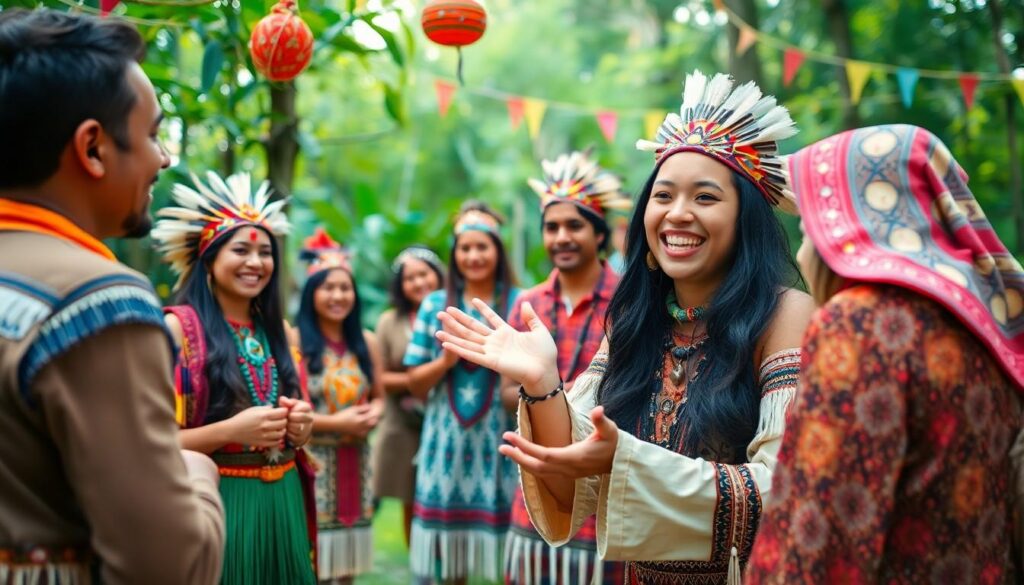Who doesn’t love a good laugh, especially when it comes with a dash of clever wordplay? Funny Red Indian names have a way of sparking curiosity and lighting up conversations. They’re playful, memorable, and perfect for breaking the ice or adding some fun to any gathering.
We all crave something unique—names that stand out and make us smile. Whether we’re looking to entertain friends, add a twist to a game night, or just satisfy our curiosity, exploring these witty names is always a hit. Let’s jump into the industry of funny Red Indian names and discover why they never fail to amuse us.
Exploring the Origins of Funny Red Indian Names
Sometimes, funny Red Indian names surprise us with their creativity and style. Looking into their background, we can see where their playfulness and charm actually come from.
Understanding the Historical Context
Each Native culture brought forward its own naming patterns, often inspired by nature, events, or personal traits. Some names, when translated or shared with English speakers, took on humorous qualities because of unfamiliar phrasing or word combinations. Over time, communities have also created playful or parody versions at social gatherings, making names like “Runs With Scissors” or “Dances With Cows” memorable at parties and in pop culture.
The Role of Humor in Native Naming Traditions
Traditions in many tribes included humor to keep spirits high and connect groups. Lighthearted names sometimes poked fun at personality quirks or special moments. By borrowing this approach, modern funny Red Indian names today keep that sense of joy alive, especially when used in group games or storytelling. We see this blend of old customs and clever wordplay sparking laughter wherever they appear.
Highlighting Popular Funny Red Indian Names

Let’s jump into some of the funniest Red Indian names that always get a smile. We often see these playful choices spark laughter and lighten the mood at parties or trivia nights.
Classic Comedic Name Examples
Picture Jumping Squirrel leading a quick game of tag—this name instantly paints a silly mental image. Happy Beaver usually makes everyone chuckle since it combines a cheerful mood with a classic animal. Sneaky Fox comes up when we want to poke fun at a friend’s playful nature. We also hear Chasing Torrent during storytelling sessions when someone races after ideas or jokes. Classic names like these cleverly mix actions, personalities, and nature to create memorable, comedic moments.
Modern Takes on Traditional Names
Sometimes, we love shaking things up with names like Jagdish Jackal, which pairs an Indian first name with an animal spirit for extra flair. Prancing Prakash is our go-to when we describe someone who can’t stop moving and keeps the room lively. Friends usually grin at Adam Antelope, noticing how a common Western name paired with an animal adds surprise. We might use Tickling Feather for someone who’s always quick with a joke or a lighthearted comment. Modern spins on traditional names keep the laughter rolling, blending different cultures, quirky actions, and nature in fresh new ways.
Analyzing the Meaning Behind Each Funny Name

Funny Red Indian names always offer more than just a laugh—they carry real stories, traits, and clever combinations. Let’s break down how literal translations and cultural references shape the humor and charm in these names.
Literal Translations and Their Hilarious Interpretations
Literal translations bring everyday actions and traits to life. Some names, like Dancing Bear, simply merge an energetic dance with a classic animal image, creating a vision of someone loveably clumsy or full of life. In another case, Sneaky Fox taps into the reputation of foxes as clever tricksters and attaches a playful suspicion about someone’s mischievous side.
We often see Laughing Loon used for those who are always cracking up or acting as the group’s joker, since loons are known for their wild, laughing calls. The name Yells at Clouds pokes fun at anyone who grumbles, even about things that don’t make sense to complain about, such as inanimate objects.
If someone’s called Stinky Tie, everyone instantly imagines a person notorious for their questionable wardrobe habits, which gives extra humor through shared experience. When names like Babbling Babu or Jolly James pop up among friends, they instantly match someone who talks non-stop or remains constantly cheerful. By blending animals or actions with quirks, names like Ticklish Turtle or Snoring Mountain serve as friendly teases rooted in real traits.
Cultural References Embedded in the Names
Nature sits at the heart of so many of these names, grounding them in cultural symbols. Naming traditions like Soaring Eagle, Howling Wolf, or Whisper Wind demonstrate deep respect for animals, wind, and spirit—the essentials of Native heritage. We notice that even when names aim for laughs, such as Giggling Grizzly or Chuckles With Wolves, the choice of animal reveals traditional values mixed with comic flair.
Multiple names capture personal quirks or memorable incidents. For instance, Loses Her Dentures or Always Needs a Nap use funny day-to-day realities to create instant character sketches. Patterns in Native naming also draw connection to events or unique behaviors, giving us names like Rolling Turtle or Flying Squirrel that buzz with lively energy, referencing actions or dreams.
Names never lose sight of cultural reverence, even as they get a silly twist. Their playful sound masks the genuine respect for the forces and creatures of nature, making each funny Red Indian name both a heartfelt and a lighthearted tribute.
Debunking Myths About Funny Red Indian Names

Let’s address some common misunderstandings about “funny Red Indian names.” We often see names shared for laughs, but it’s important we understand the reality behind them.
Separating Fact from Stereotype
Some people use the term “Red Indian,” but that’s outdated and can come off as disrespectful. We should say “Native American” or use the name of a exact tribe. Lists of so-called “funny Native American names” tend to rely on stereotypes. For instance, someone might create a name like “Jumps Like Moose” without realizing that actual Native American naming traditions hold deep meaning. Many Native American names, such as Whisper Wind and Soaring Spirit, mark important events or personal attributes. These aren’t jokes; they’re rich with cultural and spiritual significance. When we laugh at these names, we risk misunderstanding and trivializing a person’s story and heritage.
Respecting Heritage While Enjoying Humor
Sometimes humor can be a way to connect to a culture, but we should never do it at the expense of respect. True Native American names—like Laughing Loon or Sassy Tongue—carry real stories and cultural weight, even if they sound light or whimsical to English speakers. Learning why someone is named Whisper Wind, for example, gives us insight into traditions instead of just sparking laughter. Rather than using stereotypes, we can find authentic names and discover the fascinating meanings behind them. This way, we laugh with understanding and keep the focus on honoring the traditions tied to these names.
Sharing Memorable Stories Behind the Names

We love discovering the stories behind funny Red Indian names because they capture real moments and vivid personalities. Sometimes just hearing the background makes the name twice as entertaining and meaningful.
Anecdotes from History and Folklore
Growing up, many of us heard about names like Loud Snoring or Dancing Bear being handed down after a family event or a hilarious incident. Friends and elders often shared tales where someone earned the name Crooked Branch after a mishap while climbing trees. Sly Sky sometimes describes a person who always outsmarts the group during games or hunting.
Stories from tribal folklore make these names even more memorable. Imagine someone called Loses Her Dentures because, as legend goes, she misplaced them at every gathering. Communities often retell the tale of Yells at Clouds, the grumpy elder who spent afternoons shaking a fist at the sky. Moments like these get immortalized, leaving everyone with a story and a smile.
Modern-Day Uses in Media and Pop Culture
Content creators today keep the tradition alive by introducing funny Native-inspired names in sketches or comics. Social platforms like TikTok show creators using names like Hawk or Prancing Prakash to play up quirky personalities and connect with wider audiences. Cartoons often feature characters with names such as Jagdish Jackal or Adam Antelope, adding comic relief and cultural color at the same time.
Writers and comedians take inspiration from classic names like Laughing Wolf or Sneaky Fox, crafting stories or routines that both entertain and honor these playful identities. Audiences recognize the humor while appreciating the cultural roots, so each story or punchline feels unique and authentic.
Creating Your Own Funny Red Indian Names

Making up funny Red Indian names can spark creativity and a lot of laughs, especially if we stick to being thoughtful and respectful about the cultures we reference. Let’s look at the best ways to keep things light while making sure we honor Native American traditions.
Tips for Crafting Lighthearted and Respectful Names
We always start by learning about authentic Native American naming traditions. These names usually come from nature, special traits, or even fun quirks in someone’s personality. Using this spirit, we try to build names that are playful but do not lose their deeper meaning.
Choosing to include animals or natural elements like rivers or sky will instantly make names feel lively and genuine. For example, picking “Dancing Bear” or “Jumping Squirrel” lets animals bring humor but stays true to the classic style. Moving beyond nature, using positive and funny character traits, like “Laughing Wolf” or “Brave Bark,” adds originality and helps avoid dull or inappropriate stereotypes.
Adding a clever twist with word combinations can make names shine. We might bring in alliteration or pair a common name with a quirky action—think “Adam Antelope” or “Chuckling Kitlesh.” Every choice should avoid clichés and caricatures, focusing instead on names that respect and uplift.
Tools and Resources for Name Generation
We find online lists like Slangsandnames or Relationshipnames handy when we need ideas that fit both funny and respectful contexts. Browsing these sites helps us come up with names that are playful and in tune with cultural values.
Getting inspired by guides and social media is another smart move. Watching TikTok clips or reading cultural forums introduces us to how Native communities use humor, making it easier for us to get the spirit right. We always double check that the sources present content in a way that is appreciative, not mocking.
Whenever possible, we tap into cultural resources from exact tribes. Whether it’s reading about traditional naming rules or talking to people who know the history, this insight keeps our creations authentic. By combining online tools, trusted lists, and actual Native perspectives, we can create names that spark joy and still stay grounded in respect.
Conclusion
Exploring funny Red Indian names gives us a unique way to celebrate creativity and connect with others through laughter. By appreciating the stories and traditions behind these names, we can enjoy their humor while honoring the cultures they come from.
Let’s keep our curiosity alive and continue learning about the rich heritage that inspires such playful names. When we approach these traditions with respect, we create shared moments of joy that truly bring people together.
Frequently Asked Questions
What makes funny Red Indian names so appealing?
Funny Red Indian names spark curiosity and are memorable, making them great conversation starters. Their playful combinations of animals, actions, and traits create amusing images that lighten the mood at gatherings or social events.
Are these names rooted in real Native American traditions?
Yes, many funny names originate from authentic Native naming traditions. They often reflect personal qualities, memorable moments, or ties to nature, though some modern examples blend cultural elements or use humor creatively.
How can I create a funny but respectful Native-inspired name?
To make a respectful, humorous name, draw inspiration from nature or positive traits. Avoid stereotypes, and ensure you honor and respect Native American traditions. Use online resources or cultural insights for idea generation.
Are all Red Indian names meant to be funny?
No, not all are meant to be funny. Many Native names hold deep cultural, personal, or spiritual significance. Humor in naming is just one aspect and should always be treated with respect for the culture.
Why should we avoid using stereotypes with these names?
Using stereotypes can be disrespectful and diminish the true meaning behind these names. It’s important to understand and appreciate the real stories, values, and traditions that these names represent.
Can these funny names be used for parties or games?
Yes, funny Native-inspired names can add fun to group games or gatherings. However, make sure to use them thoughtfully and respectfully, without trivializing cultural significance.
What are some examples of funny Red Indian names mentioned in the article?
Some examples include Jumping Squirrel, Happy Beaver, Dancing Bear, Sneaky Fox, Laughing Loon, and Yells at Clouds. These names cleverly combine traits, actions, or nature for a comedic effect.
Is it okay to blend different cultures in these names?
Blending cultures for humor, as in names like Prancing Prakash, can be fun, but it should always be done with sensitivity and respect for all cultures involved.
How do these names highlight respect for nature?
Funny Native-inspired names often feature animals or natural elements, reflecting the deep connection many Native cultures have with the environment. This adds an element of reverence alongside the humor.
Why is terminology important when discussing these names?
Using respectful terms like “Native American” or referring to specific tribes avoids perpetuating outdated or insensitive language. Proper terminology helps foster understanding and appreciation for the culture.







